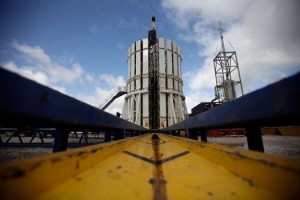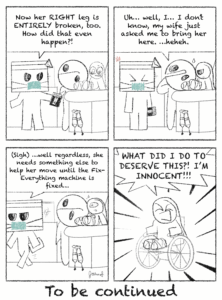
Courtesy of examiner.com
Hydraulic fracturing, or fracking, is a drilling technique that uses a high-pressure mixture of water, sand and chemicals to break apart rock and free natural gas. It has created quite the controversy, as economic benefits and several environmental concerns surface.
The benefits of fracking are numerous; natural gas is abundant and significantly cleaner to produce and burn than other fossil fuels. However, there are many environmental concerns about fracking; the 80,000-pound trucks necessary to transport the materials used for fracking will increase traffic on roads unfit to carry such weight, causing infrastructure damage.
There is also concern about the undisclosed chemicals used in fracking.
Let us analyze these costs and benefits in terms of how likely each are to occur.
We can assume the estimates of the increased quantity of attainable natural gas is accurate because it is in the companies’ best interest to research the area so that they will get the most natural gas per dollar spent. Additionally, natural gas is cleaner than coal. While it emits methane, a greenhouse gas that burns hotter than CO2, it is in the atmosphere for less than 20 years. The CO2 from other fuel sources like coal stays in the atmosphere for centuries, which can have catastrophic long-term effects. Thankfully, if we continue our excavation of natural gas in 2013, gas is estimated to reduce CO2 emissions by 300 million tons by replacing coal nearly one-for-one. Natural gas would improve air quality compared to a world that uses coal instead of natural gas.
Moving to the costs, the deterioration of the roads from the heavy traffic is just that: a cost. Simply because a cost exists does not mean that we should immediately dismiss the idea; everything has a cost. For example, instead of getting up at 5:45 a.m., I could have slept until noon. The cost of getting up at 5:45 a.m. was the loss of 6 hours and 15 minutes of sleep. However, sleeping until noon has a cost, too — I miss my 6:30 a.m. meeting. To speak to the second cost that I mentioned, there is legislation regarding this issue, but there are large loopholes that companies take advantage of, such as labeling their chemical mixture as “proprietary,” meaning the mixture cannot be made known to the public. However, any request to do so must be approved by regulators.
Fracking is a regulated activity, and concerns over the chemicals are not being ignored. For this reason, I do not see this as a large cost, as it has a very small probability of causing any damage to people or the environment.
So, we should indiscriminately frack, right? No, that is not at all what I am saying. The fact that there have been no confirmed instances of water contamination is not evidence enough to say that it will never happen. I suggest that we frack, but responsibly and safely, making sure to set a standard procedure and safety process. The technology and techniques are only improving with time, so this should not be an unachievable goal. It will allow us to reap the benefits of fracking while maintaining a level of environmental integrity and safety.
Chenoweth is a member of the class of 2015.

